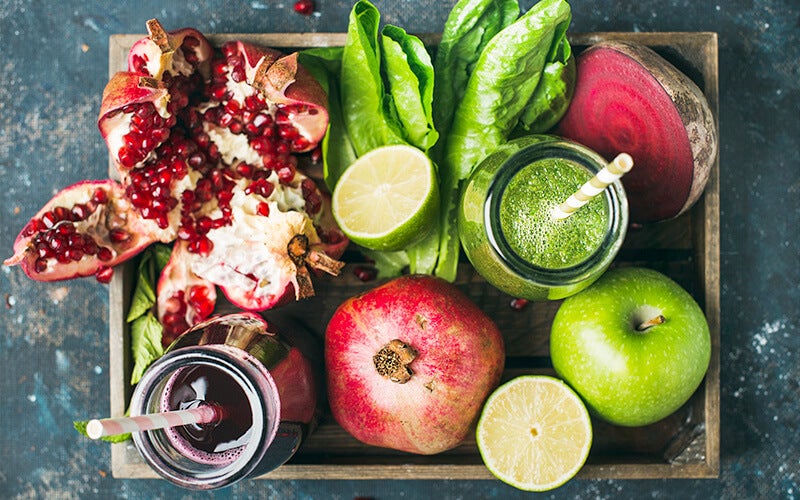How to boost your immune system: Try our 9 tips!
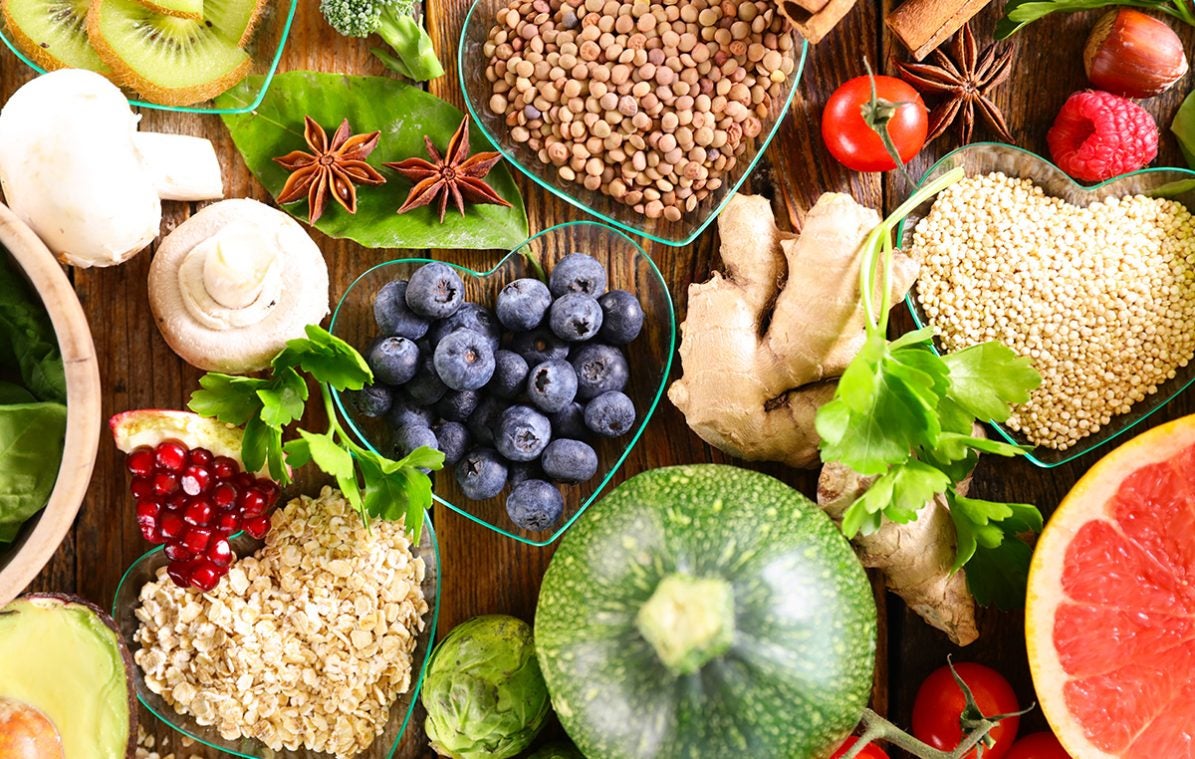 ©Margouillatphotos
©Margouillatphotos
Having a strong immune system can give you a buffer against frequent illness. Let us show you how to boost your immune system in all seasons. It all starts with a dose of mindfulness and a spoonful of the right nutrition.
Your immune system is a complex set of physical defense mechanisms. It prevents viruses and bacteria from entering your body and getting you sick.
You can boost your immune system with a balanced diet, plenty of rest, and a few healthy lifestyle changes.
Boost your immune system with vitamins and minerals
Your immune system needs numerous different nutrients to function normally. All the micronutrients, including vitamins, minerals, and essential elements, reinforce the body’s defenses. Without them, nothing is possible.
Careful: The type and amount of nutrients you need varies from person to person. The values we’re giving you below are based on averages and should only be used as guidance. If you’re not sure you’re meeting your nutritional demands, talk to your doctor.
Strengthen your immune system by getting the vitamins you need
Vitamins are organic compounds that are involved in almost every metabolic process in your body. Some vitamins – known as essential vitamins – cannot be made by your body and can only be obtained through what you eat or supplements you take. To ensure your immune system functions properly, you need vitamins A, B, C, D and, most of all, E.
Vitamins B and C are water-soluble (they can be dissolved in water). Meanwhile vitamins A, D and E are fat-soluble: they need to be consumed with a fat source to be properly absorbed. That’s not hard to do, though. Add a dash of olive oil to your meal, and you’re good to go.
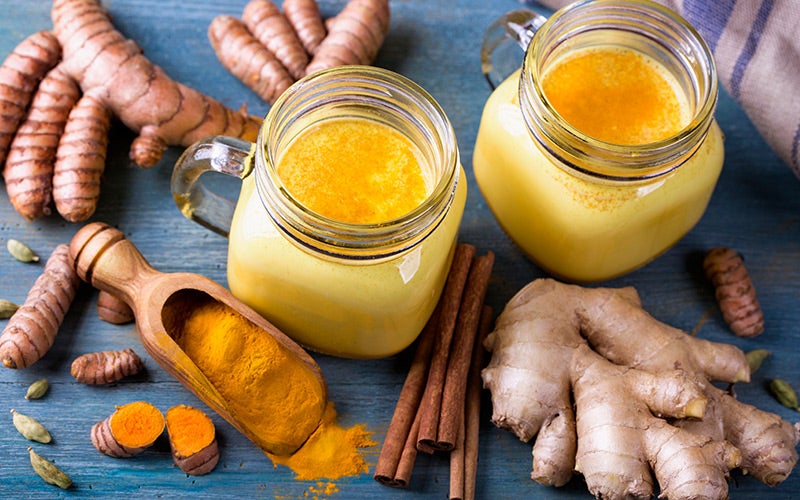
Vitamin A
How does vitamin A help the body’s defenses?
Vitamin A contributes to the proper functioning of the mucous membranes and iron metabolism. Mucous membranes are part of the non-specific immune system which prevents viruses and bacteria from entering your body. You need between 0.8 and 1 mg of vitamin A per day.
Foods that contain vitamin A
While Vitamin A is present in only a few foods of animal origin, numerous plant-based foods contain beta-carotene, which our bodies convert into vitamin A. The following foods contain enough beta-carotene to cover your daily needs.
- 1 medium carrot
- 150g lamb’s lettuce
- 150g spinach
The vitamin B complex
How does the B vitamin complex help the body’s defenses?
B vitamins are among the most important vitamins. In one way or another, they are involved in almost every metabolic process in your body. Vitamins B2, 6, 9, and 12 are particularly helpful at strengthening the immune response.
Like vitamin A, vitamin B2 (riboflavin) maintains proper functioning of the mucous membranes and iron metabolism. It also reinforces the immune cells that prevent oxidative stress.
Vitamin B6 contributes to reducing fatigue, among other things, and plays a role in metabolizing protein. Vitamin B9 (folic acid) promotes normal blood production and maintains immune system functioning. Vitamin B12 also keeps the immune system in working order.
Foods that contain B vitamins
Vitamin B12 is only present in foods of animal origin. If you eat mainly plant-based foods, then you’ll need to supplement vitamin B12 to meet your daily needs. Otherwise, here’s a few vitamin B-containing foods to support your intake:
- for vitamin B2: 100g almonds, 140g soybeans, 300g mushrooms
- for the B6 vitamin: 150g walnuts, 250g chickpeas, 1 banana
- for vitamin B9: 100g chickpeas, 200g lamb’s lettuce, 180g lentils
- for vitamin B12: 150g Emmental cheese, approx. 150g Camembert, vitamin B12 pills
Our tip: Our Vitamin Drops B12 are an easy and efficient way to get what you need. They reinforce both the nervous and immune systems and help you feel less tired. They’re made in Germany with entirely plant-based ingredients!
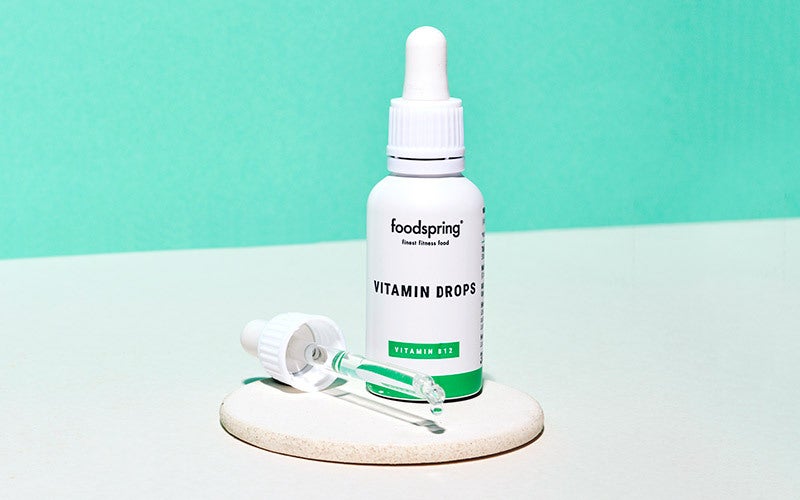
Vitamin C
How does vitamin C help the body’s defenses?
Vitamin C has a number of different functions. It protects the immune cells that prevent oxidative stress, improves your ability to absorb iron, and immediately boosts your body’s immune function. You need about 110 mg of vitamin C per day.
Foods containing vitamin C
In our western diet, it’s extremely rare to have a vitamin C deficiency because the vitamin is present in almost all varieties of fruits and vegetables.
- 80g bell pepper
- 100g broccoli
- 110g potatoes
Vitamin D
The so-called sunshine vitamin contributes directly to the proper functioning of a healthy immune system. It’s also responsible for cell division, bone preservation, and maintaining calcium levels. You need approximately 20 µg of vitamin D per day.
Foods that contain vitamin D3
During the summer, your body makes vitamin D every time your skin is exposed to sunlight (without sunscreen). During the winter when there isn’t as much sun, your only option is to get it from your diet. Our body’s required amounts of vitamin D only occur in a few animal products. Plant-based foods do not contain any vitamin D at all.
But consuming vitamin D through animal products isn’t the most efficient way to get what you need. Our bodies don’t absorb it the same way they do during the summer from the sun, and as a result it has less of an effect. That’s why it’s important to supplement your vitamin D during the winter.
- 100g herring
- 100g trout
- Vitamin Drops D3K2
Our Vitamin Drops combine vitamin D3 and K2 with plant-based ingredients alone. They give you everything you need and are easy to dose and consume. Add a few drops to your morning water and forget about choking down a big vitamin pill.
Vitamin E
How does vitamin E help the body’s defenses?
Vitamin E protects cells from oxidative stress. Oxidative stress leads your body to release free radicals that weaken your immune response and performance if they aren’t neutralized. You need about 10 to 15 mg of vitamin E per day.
Foods that contain vitamin E
- 80g flax seeds
- 300g sweet potatoes
- 50g hazelnuts
Boost your immune system with the minerals you need
Though consuming vitamins and minerals may not provide you with immediate energy, they are essential for maintaining the health and functioning of your immune system as well as your overall performance. The more you work out, the more nutrients you need as athletes – especially endurance athletes – often need more vitamins and minerals than others.
However, it’s important to note that you shouldn’t start taking vitamins without cause. And if you think you’re deficient, we recommend checking in with your doctor to decide what’s right for you.
Iron, Zinc, and Selenium
These 3 minerals are essential to the proper functioning of the immune system. Iron is especially important because many people have iron deficiencies, sometimes critical. Women, vegetarians, vegans, and people who cannot absorb it properly are most often affected. Many athletes supplement their zinc intake to boost their performance and immune defenses.
Foods containing iron, zinc and selenium
| Mineral | Daily needs | Foods |
| Iron | 10-15 mg | 200-250g amaranth 200-250g quinoa 200-350g lentils |
| Zinc | 7-16 mg | 300-400g oatmeal 400-500 g lentils 300-400 g wholegrain bread |
| Selenium | 60-70 µg | 60-70 g Brazil nuts 60-70g plain rice 50-60g white beans |
Boost your immune system with your diet: 9 tips
Eating a balanced diet is one of the best and most sustainable ways to strengthen and maintain the health of your immune response. What you eat, its quality, and the way it’s prepared all determine whether your meal will boost your body’s defenses against getting sick.
1. Help your gut
Eating foods that are easy to digest is the first step towards strengthening your immune system. That’s because the intestine is the center of immune function and is where most of our immune cells happen to be located.
Scientific studies suggest that consuming plant-based protein and unsaturated fatty acids can have positive effects on the composition of intestinal bacteria. It’s these bacteria that determine the health of your immune system.
Fiber is also a big contributor to the health of your intestines because it feeds the “good bacteria” – the bacteria that keeps you healthy. However, there’s no known scientific evidence that this is because of fiber specifically or because fiber-rich foods are generally healthy.
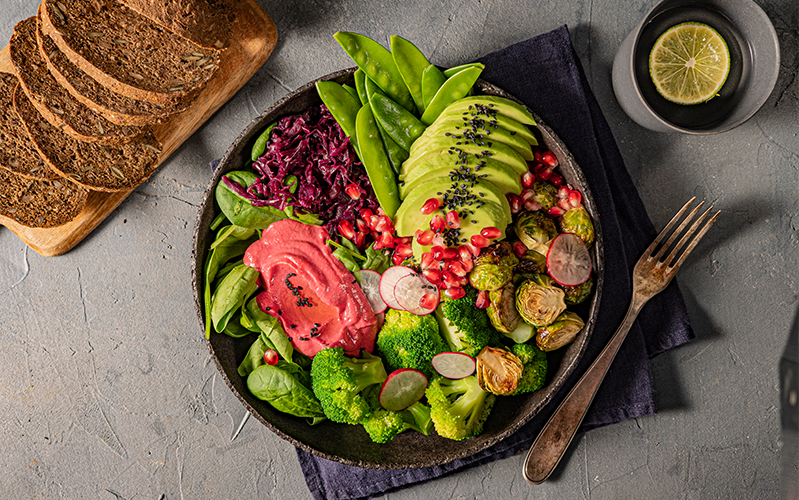
By the way: Sugar isn’t just bad for your teeth. It can also unbalance your intestinal flora, which can weaken your immune system. Are you ready to dump sugar for a work week?
Free challenge: 5 days sugar-free
2. Diversify your diet
The more colorful your plate is, the more immune boosting it is. Those colors represent all the vitamins, minerals, and secondary plant metabolites your food contains, and if your plate is mostly beige, it probably doesn’t have a lot of what you need. Eating a diverse range of ingredients will ensure you’re not missing anything.
The next time you make dinner, try diversifying the side dishes. From whole-wheat pasta to wild rice, each satisfying accompaniment has a lot of the nutrients you’re looking for.
Challenge idea: Each week, buy just one new seasonal, local fruit or vegetable from the farmers market that you’ve never cooked before. That way you’ll gradually get to know new ingredients without overwhelming yourself all at once.
If you’re in need of a little recipe inspiration, try filtering our fitness recipes to adapt to any diet challenge out there. We’ve got you covered, be it vegetarian, paleo, gluten-free, sugar-free, or lactose-free! And did we mention they all taste amazing?
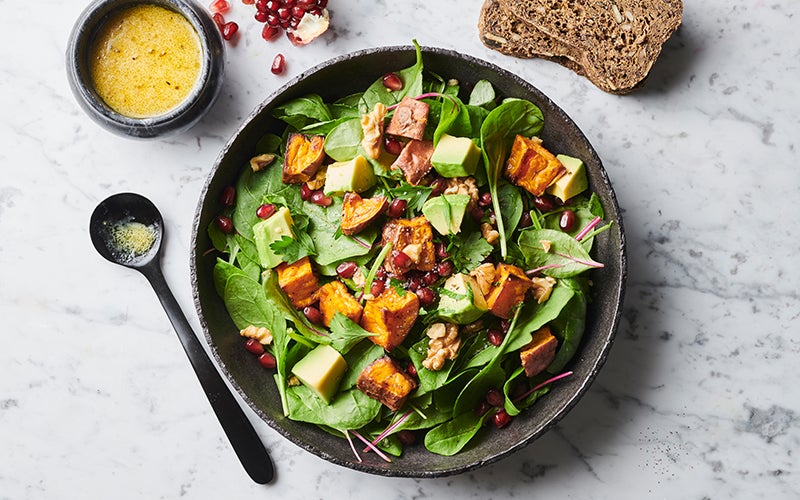
3. Load up on vegetables
Though we’ve all been told to eat five fruits and veggies a day, that’s easier said than done. Instead, we recommend eating 1 to 2 pieces of fruit and 2 to 3 vegetables a day. Vegetables contain more fiber and less fructose, making them easier on your stomach and your immune system.
Our tip: If you can’t seem to eat enough fruits and vegetables, our Daily Vitamins have everything you need crammed into a tiny package. They’re made in Germany with entirely plant-based ingredients.*
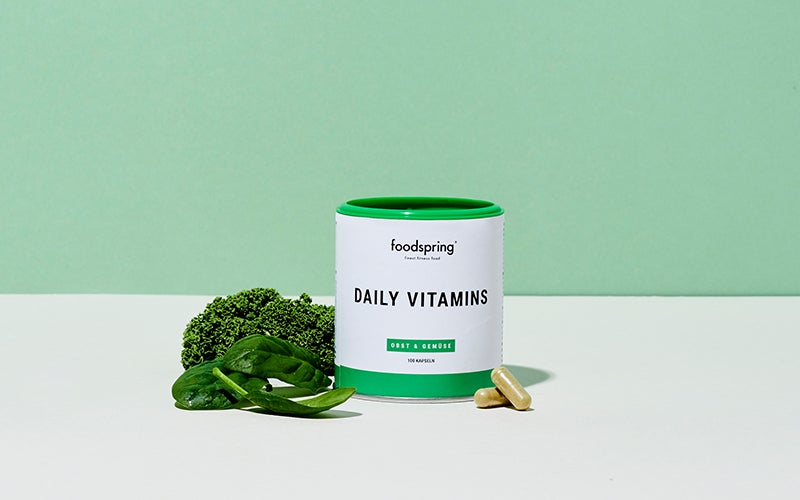
*Nutritional supplements are not a substitute for a balanced diet.
4. Opt for whole-grain products over white flour products
Most cereals are available either whole grain or refined. If you see the term complete on the box, that means that the entire grain has been used. Refined products like pasta use white flour made from grains that have been husked and processed, and there are far fewer gut- and immune-friendly nutrients at play without those husks.
5. The fresher, the better
Fresh food contains a large amount of vitamins and nutrients, many of which play a big role in strengthening your immune system. Fruits and vegetables contain the most nutrients immediately after harvesting. The easiest way to get the most nutritionally-rich products is to grow them yourself. Otherwise, buying local and seasonal vegetables is also a good option.
In general, local produce is better because it has a smaller ecological footprint than produce imported from thousands of kilometers away. It also tastes a lot better because it hasn’t had to spend hours in a warm shipping container losing its flavors and nutrients. So try to opt for whatever is growing near you whenever possible.
And what can you do in winter when nothing’s fresh? Frozen fruits and vegetables are a good option because they’re flash frozen soon after harvest and retain a lot of the nutrients they had when first picked. Just be sure to double check the ingredients list before adding it to your cart – ideally it should contain only the name of the vegetable and no added substances.
6. Eat more plants.
Plant-based foods contain valuable secondary plant metabolites, which are found exclusively in plants and are believed to have many health benefits. They’re purported to fight free radicals and strengthen the immune system as a result.
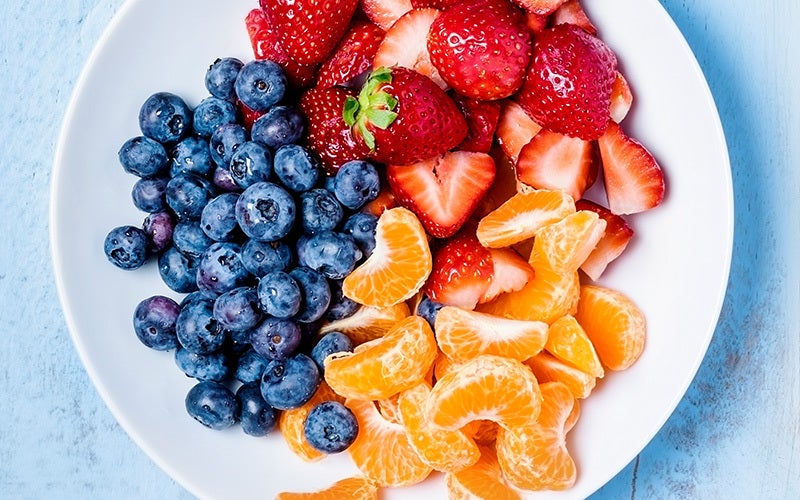
Because the effects of they’re difficult to study, there is currently no established research on the effects of secondary plant metabolites on the immune system. It’s always possible that plant-based foods have a positive effect on the immune system simply because they’re healthy for other reasons, like the nutrients and minerals they contain. Whatever the reason, they’re great for your immune system.
Discover our vegan fitness food
7. Hydrate often
In general, try to choose tea and water above all else. Drinking enough water keeps your mucous membranes hydrated and helps maintain your defenses. Dry mucous membranes are an invitation for viruses and bacteria. Try to drink two liters of water a day plus an additional liter for every hour of exercise you do. Use our tips to guarantee you’re drinking enough water every day.
8. Amino acids: huge allies for athletes’ immune systems
During and after an intensive workout, your immune system is put to the test. Your immune system builds antibodies in order to protect itself, but it can’t do this without L-glutamine. Because glutamine is one of the most important components of the muscles, your body’s supply becomes depleted after an intensive workout.
Glutamine supplements are the best way to ensure you’re producing as many antibodies as you need in order to recover from your workout.
9. Aromatic plants and spices may help
Though there’s not a lot of research to back up aromatherapy, there is plenty of anecdotal evidence. People say lavender soothes the mind, sage has antibacterial properties, chamomile relieves stomachaches, and ginger, turmeric, garlic, and honey all have anti-inflammatory properties. While these natural remedies are not scientifically proven to strengthen the immune system, they can at least help you feel a bit better when you’re under the weather.
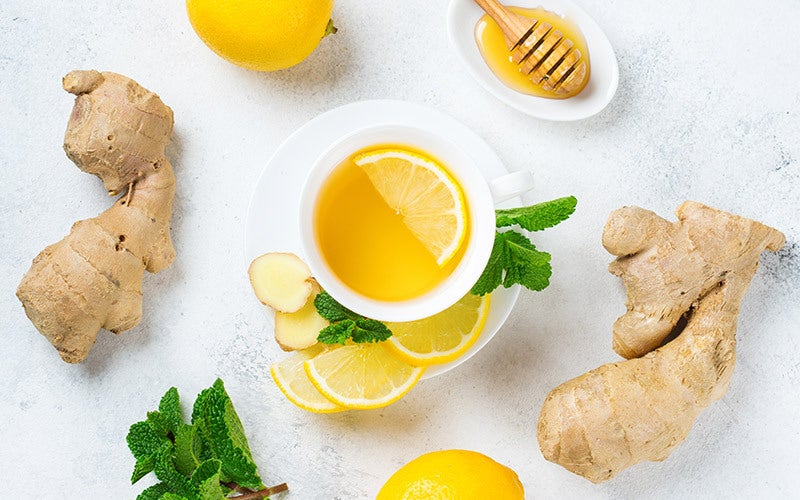
And it’s unlikely that ginger tea will be harmful to your health, so there aren’t many risks involved with trying out a home remedy like this one.
Boost your immune system with home remedies
It’s totally possible to strengthen your immune system in a natural way without any supplements. All you need is to pay more attention to your body and the way you’re feeling.
1. Respect your days off
Just like your body, your immune system also needs time to rest and strengthen itself. Lack of rest disrupts your hormones and causes your body to produce too little testosterone and too much cortisol. Having a permanently high cortisol level weakens the immune system.
2. Go for a walk
Going for a walk outdoors helps relieve stress, gives the brain a break, and supplies it with fresh oxygen. And if you go out in the middle of the day, you can also get some vitamin D for your immune system.
3. Take time to unwind
Being stressed causes your cortisol levels to increase, and your immune system can suffer if they stay at a high level for a long period of time. Luckily there are plenty of easy ways to reduce stress, including walking outdoors, meditating, light exercise, and mindful breathing. Even an evening on the couch can do the trick! It all depends on what makes you feel good.
4. Get enough sleep
In addition to a healthy diet, restful sleep is the basis for a strong immune system. Establishing a good sleep routine will optimize how you recover during the night. Try to get in and out of bed every day at regular times. Even on weekends.

To do that, figure out how much sleep you need and plan your nightly schedules accordingly. Having trouble falling asleep? Check out our 8 tips to sleep well.
5. Open the windows
Regularly ventilating your home removes stale air and any viruses and bacteria that may be in it and replaces it with fresh, oxygenated air.
6. Alternate between hot and cold water while showering
Studies suggest that alternating hot and cold showers strengthens the immune system. People who practiced this method have been less likely to get sick. A study from the University of Jena also found that showering this way could increase the number of lymphocytes in a person, the white blood cells responsible for protecting our immune system from pathogens.
7. Clean your tongue
In Ayurvedic tradition, tongue cleaning is as important to a daily routine as brushing teeth. Toxic substances and bacteria accumulate during the night, taking the form of a whitish deposit. If you wash your tongue before you brush your teeth, you will remove these toxic substances from your body.
However, the benefits of this practice on the immune system and oral health have not yet been scientifically proven. But even Western doctors agree that it can’t hurt to try.
8. Smile more often
Smiling releases happiness hormones and reduces stress hormones. That’s why smiling causes you to relax. Even if you force yourself to laugh when your heart isn’t really in it, moving your facial muscles in such a way will help you feel more relaxed and happy while also strengthening your immune system.
9. Train your immune system
Strengthening your immune system is similar to strengthening your muscles. To make it happen, you have to work on it. In general, exposing your immune system to more external stimuli, such as viruses and bacteria, can enable it to better fight them off. Sharing food at a picnic or kissing your partner can expose you to antibodies that will prevent illness later on. Of course, this all depends on the risk levels associated with what you’re exposed to. The common cold is no big deal, but with an immune-weakening virus like COVID-19, for example, it’s best to limit your exposure whenever possible. Here’s what can cause a weakened immune system.
There are many reasons why you might have a weakened immune system. In general, though, it’s always best to get a precise diagnosis from your doctor instead of self-diagnosing. In the meantime, these are some of the most common causes and how you can correct them yourself.
Too much sugar and too few nutrients
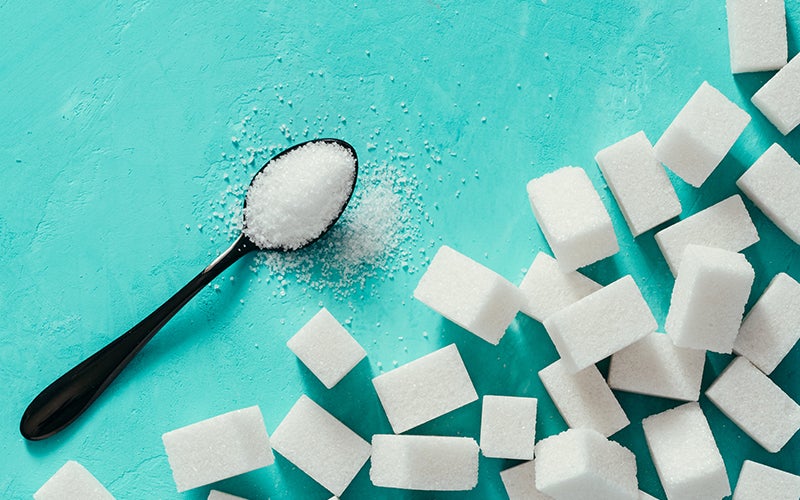
©Fascinadora
The fewer nutrients you eat, the more likely you are to weaken your immune system. On the other hand, you’ll feel better if you eat less sugar, because a surplus of sugar promotes inflammation and can disrupt the balance of your intestinal flora. Sugar also has a chemical composition similar to vitamin C, meaning the more you eat the less vitamin C your body is able to absorb. And your immune system needs vitamin C to stay strong!
You’re working out too much or too little.
Even the smallest amount of physical activity can boost the immune system. But over or undertraining has the opposite effect and can weaken your immune system. Finding a balance between the two is key.
Chronic stress and lack of sleep
Both cause an increase in cortisol levels, which is responsible for putting your immune system on red alert. After a while at these levels, your immune system will be exhausted and unable to fight off illnesses. Be sure to give yourself enough time to rest and recover from your busy life.
Alcohol and nicotine
Alcohol is a diuretic, which means it makes you urinate more often which removes fluids and nutrients from your body. This also causes dehydration which prevents your body from breaking down toxic substances and increases your cortisol levels as a result. Increased cortisol levels can degrade the quality of your sleep and limit your ability to absorb nutrients, among other things. Nicotine slows down the white blood cells that are responsible for manufacturing antibodies.
Dry air and dehydration
Both dry out your mucous membranes and make you more likely to get sick from viral and bacterial infections.
©Foxys_forest_manufacture
How does the immune system work?
Our immune system’s functions are very complex and still the subject of scientific research. To sum it up, they can be divided into two categories: specific and non-specific immune system.
The non-specific immune system is responsible for preventing pathogens from entering and attacking the body. It protects the mucous membranes, eyelashes, stomach acid, tears, in addition to numerous cells across the body.
The specific immune system uses lymphocytes, a type of white blood cell, to fight off only certain viruses.
Example: If all your colleagues are sick with a virus that you had a long time ago, your immune system is more likely to remember it and be able to produce antibodies to fight it off right away so that you don’t end up getting sick.
The immune system: Our conclusion
- Eating a balanced diet, working out regularly, getting fresh air, and managing stress levels will help strengthen your immune system and prevent you from getting sick.
- Certain micronutrients are also essential for maintaining a healthy immune system.
Sources for this article
We at foodspring use only high-quality sources, including peer-reviewed studies, to support the facts within our articles. Read our editorial policy to learn more about how we fact-check and keep our content accurate, reliable, and trustworthy.
- Berg, Aloys and König, Daniel: Oxidativer Stress und Sport. In: DEUTSCHE ZEITSCHRIFT FÜR SPORTMEDIZIN Jahrgang 51, Nr. 5 (2000). S. 177–178.
- Buijze GA, Sierevelt IN, van der Heijden BCJM, Dijkgraaf MG, Frings-Dresen MHW (2016) The Effect of Cold Showering on Health and Work: A Randomized Controlled Trial. PLoS ONE 11(9): e0161749. https://doi.org/10.1371/journal.pone.0161749
- DGE (as at 04.06.2020): Sekundäre Pflanzenstoffe und ihre Wirkung auf die Gesundheit https://www.dge.de/wissenschaft/weitere-publikationen/fachinformationen/sekundaere-pflanzenstoffe-und-ihre-wirkung/
- Fachgesellschaft für Ernährungstherapie und Prävention (as at 04.06.2020): Nachschlage-Tabellentool: Health Claims in Lebensmitteln Nachschlage-Tabellentool: Health Claims in Lebensmitteln
- Castell/Newsholme/Poortmans: Does glutamine have a role in reducing infections in athletes? European journal of applied physiology, S. 488-490,1998
- Holger, Gabriel: “Auswirkungen von Sport auf das Immunsystem”. In: Notfall & Hausarztmedizin 32 S. 411–415. August 2006.
- Mason K.L., Huffnagle G.B., Noverr M.C., Kao J.Y. (2008) Overview of Gut Immunology. In: Huffnagle G.B., Noverr M.C. (eds) GI Microbiota and Regulation of the Immune System. Advances in Experimental Medicine and Biology, vol 635. Springer, New York, NY
- Reynolds, Andrew et al. “Carbohydrate quality and human health: a series of systematic reviews and meta-analyses” IN The Lancet, Elsevier. 2–8 February 2019
- Singh, Rasnik K et al. “Influence of diet on the gut microbiome and implications for human health.” Journal of translational medicine vol. 15,1 73. 8 Apr. 2017, doi:10.1186/s12967-017-1175-y
- DGE (as at 04.06.2020): Vitamin A, β-Carotin https://www.dge.de/wissenschaft/referenzwerte/vitamin-a-b-carotin/
- DGE (as at 04.06.2020): Vitamin C https://www.dge.de/wissenschaft/referenzwerte/vitamin-c/
- DGE (as at 04.06.2020): Vitamin E https://www.dge.de/wissenschaft/referenzwerte/vitamin-e/






























